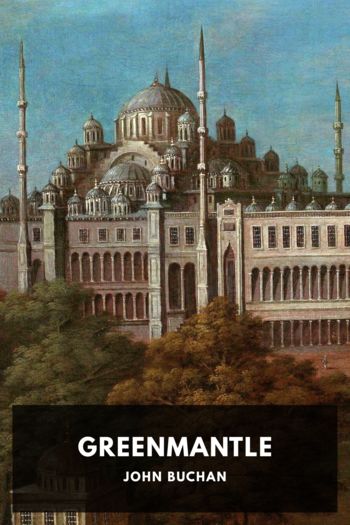Mr. Standfast - John Buchan (autobiographies to read TXT) 📗

- Author: John Buchan
Book online «Mr. Standfast - John Buchan (autobiographies to read TXT) 📗». Author John Buchan
All through the meal I sat in a kind of stupor. I was trying to assimilate the new Blenkiron, and drinking in the comfort of his heavenly drawl, and I was puzzling my head about Ivery. I had a ridiculous notion that I had seen him before, but, delve as I might into my memory, I couldn’t place him. He was the incarnation of the commonplace, a comfortable middle-class sentimentalist, who patronized pacificism out of vanity, but was very careful not to dip his hands too far. He was always damping down Blenkiron’s volcanic utterances. “Of course, as you know, the other side have an argument which I find rather hard to meet …” “I can sympathize with patriotism, and even with jingoism, in certain moods, but I always come back to this difficulty.” “Our opponents are not ill-meaning so much as ill-judging,”—these were the sort of sentences he kept throwing in. And he was full of quotations from private conversations he had had with every sort of person—including members of the Government. I remember that he expressed great admiration for Mr. Balfour.
Of all that talk, I only recalled one thing clearly, and I recalled it because Blenkiron seemed to collect his wits and try to argue, just as he had done at the end of his lecture. He was speaking about a story he had heard from someone, who had heard it from someone else, that Austria in the last week of July 1914 had accepted Russia’s proposal to hold her hand and negotiate, and that the Kaiser had sent a message to the Tsar saying he agreed. According to his story this telegram had been received in Petrograd, and had been rewritten, like Bismarck’s Ems telegram, before it reached the Emperor. He expressed his disbelief in the yarn. “I reckon if it had been true,” he said, “we’d have had the right text out long ago. They’d have kept a copy in Berlin. All the same I did hear a sort of rumour that some kind of message of that sort was published in a German paper.”
Mr. Ivery looked wise. “You are right,” he said. “I happen to know that it has been published. You will find it in the Wiener Zeitung.”
“You don’t say?” he said admiringly. “I wish I could read the old tombstone language. But if I could they wouldn’t let me have the papers.”
“Oh yes they would.” Mr. Ivery laughed pleasantly. “England has still a good share of freedom. Any respectable person can get a permit to import the enemy press. I’m not considered quite respectable, for the authorities have a narrow definition of patriotism, but happily I have respectable friends.”
Blenkiron was staying the night, and I took my leave as the clock struck twelve. They both came into the hall to see me off, and, as I was helping myself to a drink, and my host was looking for my hat and stick, I suddenly heard Blenkiron’s whisper in my ear. “London … the day after tomorrow,” he said. Then he took a formal farewell. “Mr. Brand, it’s been an honour for me, as an American citizen, to make your acquaintance, sir. I will consider myself fortunate if we have an early reunion. I am stopping at Claridge’s Ho-tel, and I hope to be privileged to receive you there.”
III The Reflections of a Cured DyspepticThirty-five hours later I found myself in my rooms in Westminster. I thought there might be a message for me there, for I didn’t propose to go and call openly on Blenkiron at Claridge’s till I had his instructions. But there was no message—only a line from Peter, saying he had hopes of being sent to Switzerland. That made me realize that he must be pretty badly broken up.
Presently the telephone bell rang. It was Blenkiron who spoke. “Go down and have a talk with your brokers about the War Loan. Arrive there about twelve o’clock and don’t go upstairs till you have met a friend. You’d better have a quick luncheon at your club, and then come to Traill’s bookshop in the Haymarket at two. You can get back to Biggleswick by the 5:16.”
I did as I was bid, and twenty minutes later, having travelled by Underground, for I couldn’t raise a taxi, I approached the block of chambers in Leadenhall Street where dwelt the respected firm who managed my investments. It was still a few minutes before noon, and as I slowed down a familiar figure came out of the bank next door.
Ivery beamed recognition. “Up for the day, Mr. Brand?” he asked. “I have to see my brokers,” I said, “read the South African papers in my club, and get back by the 5:16. Any chance of your company?”
“Why, yes—that’s my train. Au revoir. We meet at the station.” He bustled off, looking very smart with his neat clothes and a rose in his buttonhole.
I lunched impatiently, and at two was turning over some new books in Traill’s shop with an eye on the street-door behind me. It seemed a public place for an assignation. I had begun to dip into a big illustrated book on flower-gardens when an assistant came up. “The manager’s compliments, sir, and he thinks there are some old works of travel upstairs that might interest you.” I followed him obediently to an upper floor lined with every kind of volume and with tables littered with maps and engravings. “This way, sir,” he said, and opened a door in the wall concealed by bogus book-backs. I found myself in a little study, and Blenkiron sitting in an armchair smoking.
He got up and seized both my hands.





Comments (0)